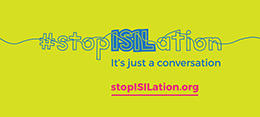11 October 2016
 Students from the University of South Australia have launched a social media campaign designed to combat violent extremism in Australia, as part of a global competition.
Students from the University of South Australia have launched a social media campaign designed to combat violent extremism in Australia, as part of a global competition.
The ‘Peer 2 Peer Challenging Extremism’, competition commissioned by the US State Department, and backed by Facebook, challenges undergraduate students to spearhead a digital/social media campaign that prevents and counters violent extremism among their peers.
A team of 16 UniSA students from different academic disciplines, including journalism, marketing, graphic design and information technology developed a social media agency called ‘The Link Collective’.
Director of UniSA’s matchstudio, Dr Jane Andrew, is managing the project and says UniSA is one of only two universities in Australia, and 95 universities worldwide, competing in the competition that will see the top three teams flown to Washington D.C. to present their campaign idea to representatives from the US State Department.
“The competition is challenging university students to develop social media strategies to counter violent extremism because their peers, 18-25 year olds, are most at risk of becoming disengaged,” Dr Andrew says.
The UniSA campaign is running from October 4 to 25 and team member Verity Reeves, says the idea behind #stopISILation is to connect young people who are at risk of engaging in violent extremism to proper support networks and educational resources.
“#StopISILation is a play on words; it’ means to reach out and stop people from being isolated and becoming radicalised, but it’s also focused on literally stopping ISIL by educating the community - so it embodies what we’re trying to do,” Ms Reeves says.
Social marginalisation and isolation from social community ties – not religion – is a key factor in some young people becoming radicalised and set on a path towards violence.
“What we’re trying to achieve, is to educate our peers about the Islamic faith and equip them with the tools to challenge violent extremism and help socially isolated people who need someone to talk to,” Ms Reeves says.
“Isolation from the proper support networks drastically increases the likelihood of a young person being radicalised by terror groups, so #stopISILation attempts to prevent this isolation by encouraging people to reach out to vulnerable individuals and start a conversation.
“Starting today, we would like all Australians to help put an end to the causes of social isolation that may lead to violence in our country.”
For more information visit http://stopisilation.org/ and upload a photo to social media with your arms outstretched (examples below) with the hashtag #stopISILation and #challengeextremism

Media Contacts: Katrina McLachlan office (08) 8302 0961 email katrina.mclachlan@unisa.edu.au mobile 0414972537




